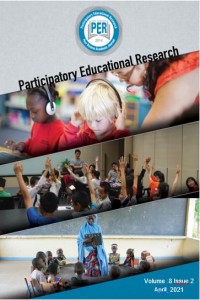Research Article
Year 2021,
Volume: 8 Issue: 2, 391 - 406, 01.04.2021
Abstract
References
- Wasike, A. (2013). Effects of attitudes of female students on the performance in mathematics in various types of secondary schools in teso district, Kenya. Journal of Education and Practice, 4(11), 119-131.
- Dobbie, W. & Fryer, R.G. (2011). Are high-quality schools enough to ıncrease achievement among the poor? Evidence from the Harlem children’s zone. American Economic Journal Applied Economics, 3(3), 158-187. https://doi.org/10.1257/app.3.3.158
- Curto, V. E., & Fryer, R. G. (2014). The Potential of Urban Boarding Schools for the Poor Evidence from SEED. Journal of Labor Economics 32(1), 65-93. https://doi.org/10.1086/671798
An examination of the relationship between secondary school students’ abstract thinking skills, self-efficacy perceptions and attitudes towards mathematics
Abstract
This study aims to examine whether there is a relationship between abstract thinking skills, self-efficacy perceptions and attitude towards mathematics and how these variables predict mathematics achievement. The study was conducted with 198 eighth-grade students who were selected by random sampling and the relational screening model was used. For data collection, the tools of “Abstract Thinking Test in Mathematics”, “Self-Efficacy Perception Scale towards Mathematics”, “Mathematics Attitude Scale” and Mathematics course notes of students were resorted to. According to the findings, it was concluded that there were significant relationships between students’ abstract thinking skills, self-efficacy perceptions and attitudes towards mathematics, and these variables explained 37% of the variance in mathematics achievement. There was no significant difference in mathematics achievement between the groups according to the type of school, while it was found that the scores of the students' abstract thinking skills, attitude towards mathematics and self-efficacy perceptions differed in favor of the students studying in non-boarding secondary school. In addition, no significant difference was observed between the groups in terms of students' mathematics achievement according to their boarding status. It was found that there were significant differences in terms of the other three variables. Suggestions were made to increase mathematics achievement, especially in boarding secondary schools, and it was also offered to increase the feasibility of the environment of the boarding secondary schools.
Thanks
This study has been produced from the master’s thesis of the second author that conducted under the supervision of the first author.
References
- Wasike, A. (2013). Effects of attitudes of female students on the performance in mathematics in various types of secondary schools in teso district, Kenya. Journal of Education and Practice, 4(11), 119-131.
- Dobbie, W. & Fryer, R.G. (2011). Are high-quality schools enough to ıncrease achievement among the poor? Evidence from the Harlem children’s zone. American Economic Journal Applied Economics, 3(3), 158-187. https://doi.org/10.1257/app.3.3.158
- Curto, V. E., & Fryer, R. G. (2014). The Potential of Urban Boarding Schools for the Poor Evidence from SEED. Journal of Labor Economics 32(1), 65-93. https://doi.org/10.1086/671798
There are 3 citations in total.
Details
| Primary Language | English |
|---|---|
| Subjects | Other Fields of Education |
| Journal Section | Research Articles |
| Authors | |
| Publication Date | April 1, 2021 |
| Acceptance Date | December 23, 2020 |
| Published in Issue | Year 2021 Volume: 8 Issue: 2 |


